25+ SAMPLE Pre-Construction Agreement
-

Simple Construction Agreement Template
download now -

Design Build Pre-Construction Agreement
download now -
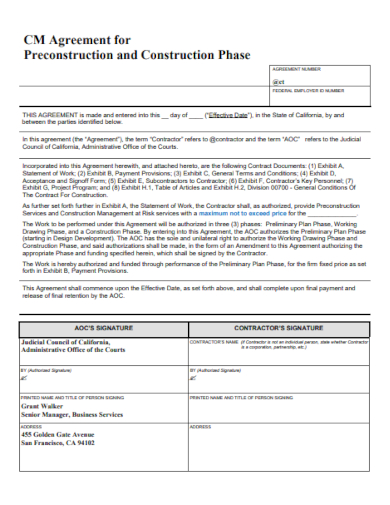
Preconstruction Phase Agreement
download now -
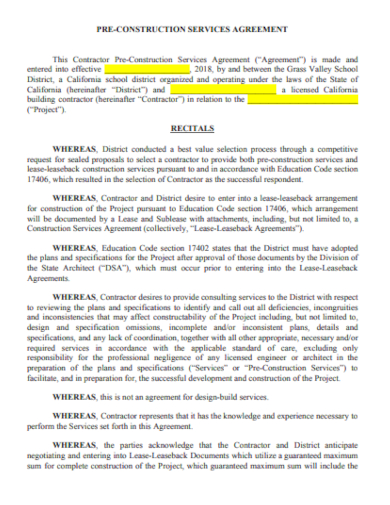
Pre-Construction Services Agreement
download now -
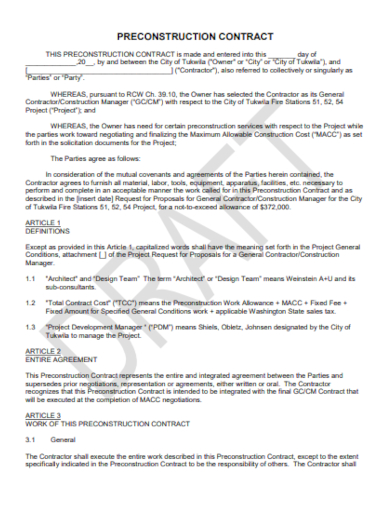
Pre-Construction Contract
download now -
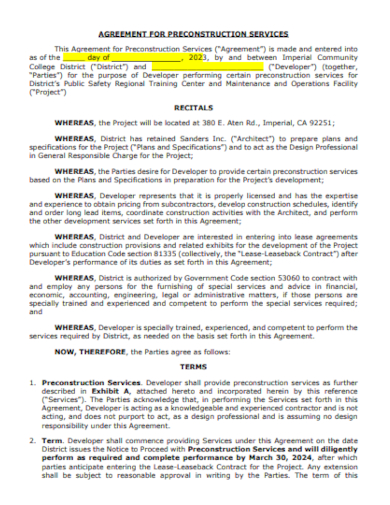
Agreement for Pre-Construction
download now -
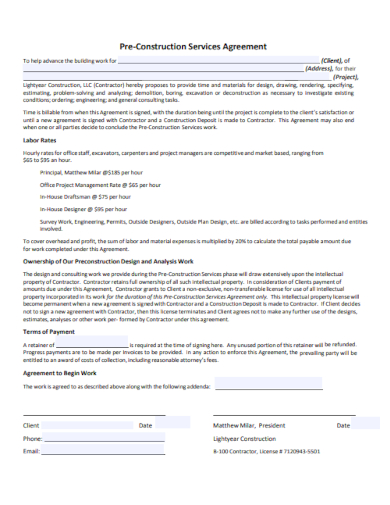
Sample Pre-Construction Agreement
download now -
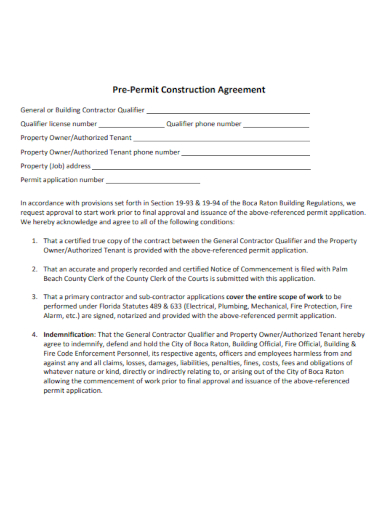
Pre-Construction Permit Agreement
download now -
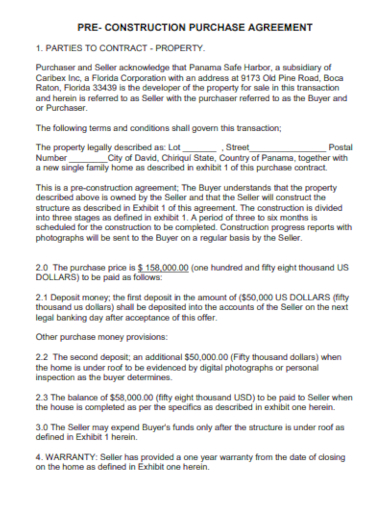
Pre-Construction Purchase Agreement
download now -
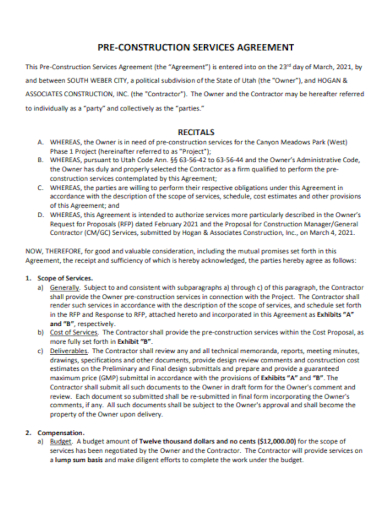
Pre-Construction Agreement in PDF
download now -
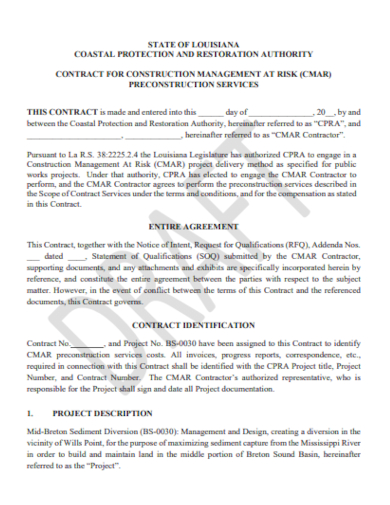
Pre-Construction Management Agreement
download now -
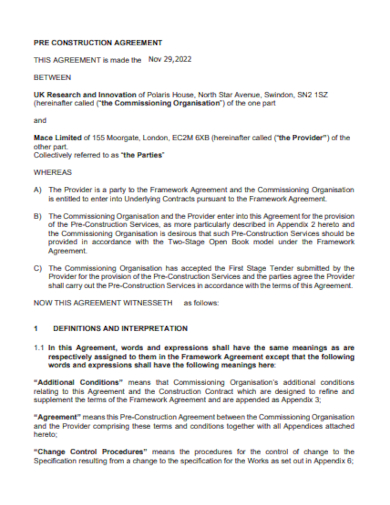
Pre-Construction Project Agreement
download now -
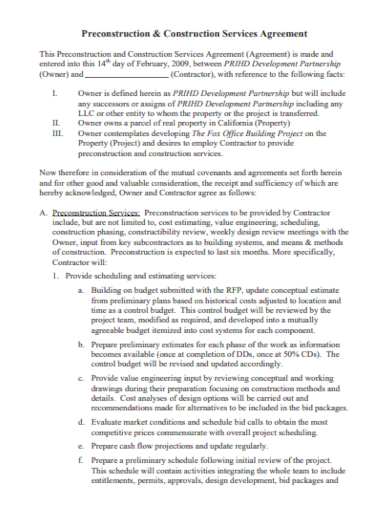
Pre-Construction and Construction Agreement
download now -
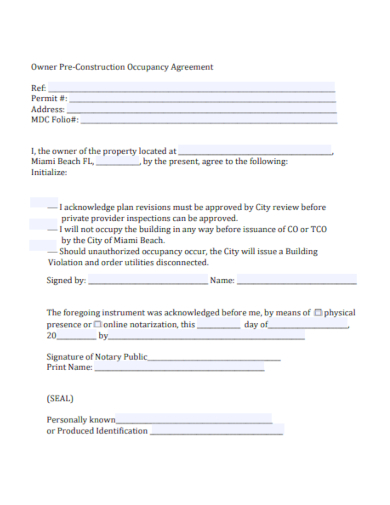
Pre-Construction Occupancy Agreement
download now -
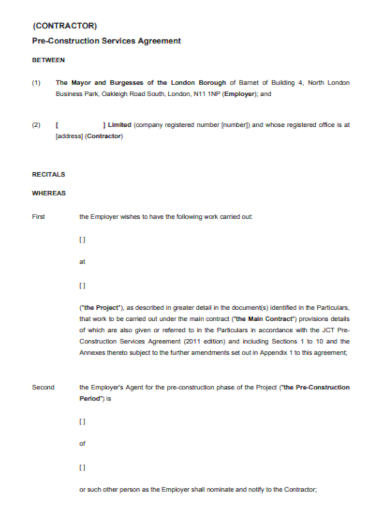
Contractor Pre-Construction Agreement
download now -
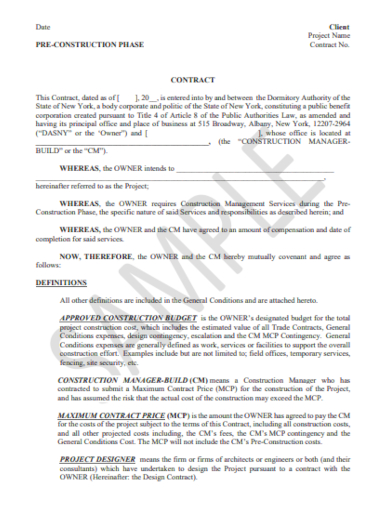
Pre-Construction Phase Contract
download now -
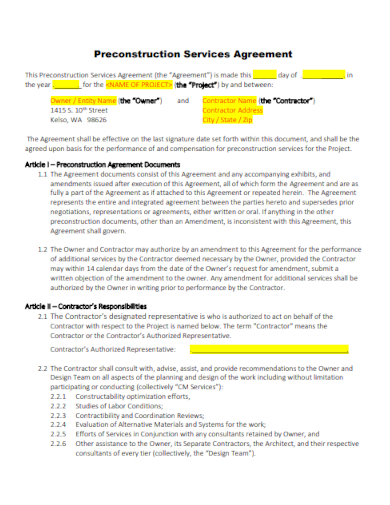
Printable Pre-Construction Agreement
download now -
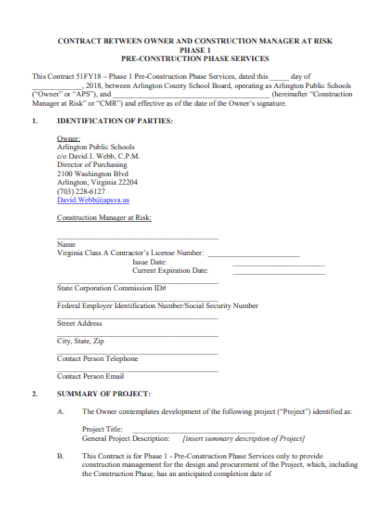
Pre-Construction Services Contract
download now -
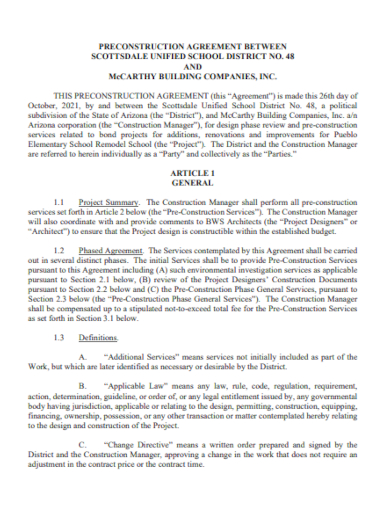
School Pre-Construction Agreement
download now -
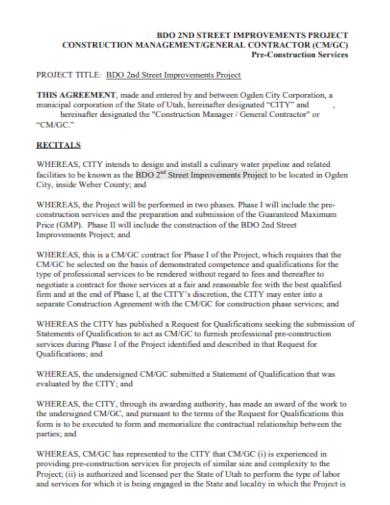
General Pre-Construction Agreement
download now -

Pre-Construction Manager Agreement
download now -
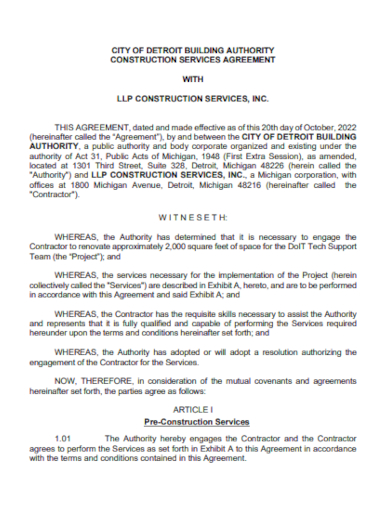
Building Pre-Construction Agreement
download now -
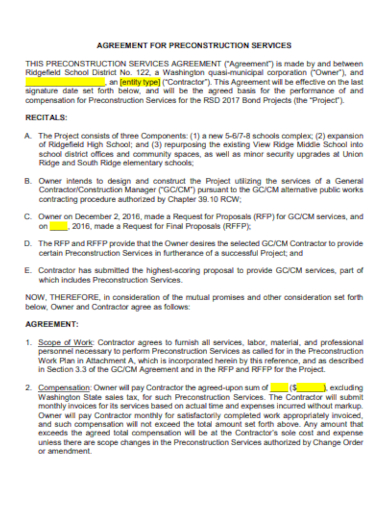
Agreement for Pre-Construction Services
download now -
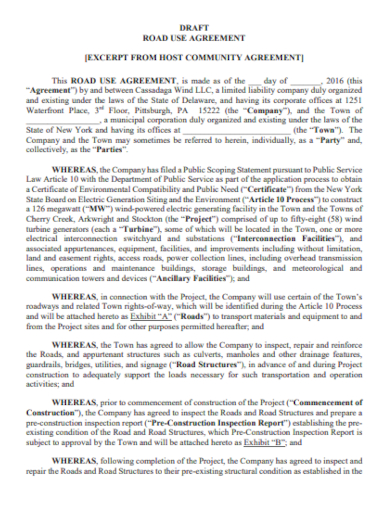
Road Pre-Construction Agreement
download now
FREE Pre-Construction Agreement s to Download
25+ SAMPLE Pre-Construction Agreement
Definition:
The Significance of a Pre-Construction Agreement:
Essential Components of the Agreement:
Benefits for Both Parties:
Common Pitfalls to Avoid:
How can a well-crafted pre-construction agreement help clarify project expectations?
Why is it important to specify the timeline and project milestones in the agreement?
What measures are taken to ensure that the agreement is legally binding and enforceable?
Can the agreement serve as a foundation for the eventual construction contract?
Why do construction companies and clients enter into pre-construction agreements?
Definition:
A Pre-Construction Agreement is a formal contract entered into before actual construction begins. It delineates the preliminary tasks, responsibilities, and fees related to planning and design stages. This agreement ensures that both the client and contractor have a mutual understanding of project scope, budget estimates, timelines, and other essential aspects before the main construction contract is finalized, fostering transparency and trust.
The Significance of a Pre-Construction Agreement:
In the vast realm of construction, the Pre-Construction Agreement serves as a protective shield for both parties, offering clarity on the initial stages of the project. It acts as a precursor to the main contract, ironing out details and ensuring smoother transitions.
Understanding the Basics:
At its core, the Pre-Construction Agreement is a commitment between the client and the contractor. It is not as detailed as the final construction contract but serves as an interim agreement before the commencement of construction. It primarily covers preliminary tasks like acquiring permits, initial inspections, feasibility studies, and other pre-construction services.
Ensuring Transparency:
One of the key advantages of this agreement is the transparency it brings to the project. By setting clear expectations regarding timelines, costs, and scope of work, it minimizes the chances of disputes or misunderstandings arising at a later stage.
Flexibility and Adaptability:
While the agreement is meant to be comprehensive, it also allows for a certain degree of flexibility. Construction projects can often face unforeseen challenges, and the agreement can be revised or updated to accommodate these changes, provided both parties agree.
Risk Mitigation:
The agreement is a proactive approach to risk management. By identifying potential risks in the pre-construction phase and outlining measures to tackle them, it ensures smoother project execution.
Financial Clarity:
Budget overruns are a common concern in construction projects. With a well-defined Pre-Construction Agreement in place, clients and contractors can have a clear financial roadmap. It outlines the estimated costs for the pre-construction phase, ensuring both parties are on the same page regarding financial commitments.
Legal Protection:
Apart from streamlining the construction process, the agreement also offers legal protection to both parties. In case of any disagreements or disputes, the Pre-Construction Agreement can be referenced to provide clarity and resolution.
Essential Components of the Agreement:
Every Pre-Construction Agreement should encompass several foundational elements:
Scope of Work:
This section defines the breadth and depth of the pre-construction services to be provided. It includes details like preliminary designs, site analysis, feasibility studies, and other preparatory tasks. By setting clear boundaries, it ensures there are no misconceptions about the contractor’s responsibilities.
Timeline:
Time is of the essence in construction. This section outlines the expected duration for each pre-construction activity. It provides both parties with a clear idea of when tasks will commence and conclude, enabling effective construction planning and resource allocation.
Payment Terms:
Financial clarity is vital for a successful working relationship. This component breaks down the costs associated with the pre-construction phase. It includes details on payment schedules, milestones, and methods of payment.
Change Orders:
Construction projects are prone to changes, often due to unforeseen circumstances. This section outlines the process and conditions under which changes can be made to the agreement, including the procedure for approvals and any associated costs.
Confidentiality Clause:
Often, the preliminary details discussed during the pre-construction phase are sensitive. This clause ensures that all information shared remains confidential, protecting both parties’ interests.
Dispute Resolution:
Despite the best intentions, disagreements can arise. Having a dispute resolution mechanism in place ensures that any conflicts are addressed promptly and amicably. This section can include mediation or arbitration procedures.
Termination Clause:
In certain situations, one party might need to exit the agreement. This component outlines the conditions under which the agreement can be terminated, any notice periods, and potential penalties or refunds.
Liability and Insurance:
This section provides clarity on who bears responsibility in case of accidents, damages, or other unforeseen events during the pre-construction phase. It may also detail any required insurance coverage to protect against potential risks.
Permits and Approvals:
Before construction can commence, various permits and approvals might be needed. This component stipulates who is responsible for obtaining these – often, it’s the contractor’s role, but the responsibilities can vary based on the project’s specifics.
Signature and Acceptance:
No agreement is valid without the express consent of both parties involved. This section provides space for both the client and the contractor to sign, indicating their acceptance of the terms laid out.
Benefits for Both Parties:
Pre-Construction Agreements aren’t just paperwork; they’re tools of empowerment. For contractors, they offer clarity on what’s expected, allowing for better resource allocation. Clients benefit from a clear understanding of costs, potential challenges, and the trajectory of the project’s early stages.
Clarity and Direction:
At its core, this agreement serves as a roadmap, detailing every nuance of the pre-construction phase. With clear deliverables, timelines, and responsibilities, both parties can navigate the initial stages with confidence, ensuring every step aligns with the project’s broader vision.
Risk Mitigation:
The construction realm is fraught with uncertainties. However, by stipulating terms for change orders, dispute resolution, and liabilities, the agreement proactively addresses potential hurdles. This proactive approach reduces surprises and ensures smoother project progression.
Financial Transparency:
With detailed payment terms and breakdowns, there’s no room for ambiguity. Clients gain insight into where their money is going, while contractors receive timely remuneration, ensuring a harmonious financial relationship throughout the project.
Flexibility with Control:
Change is inevitable, especially in the dynamic field of construction. The agreement provides a structured approach to introduce changes, ensuring that while there’s room for flexibility, it never compromises the project’s integrity or timeline.
Protection of Interests:
Whether it’s the confidentiality clause safeguarding sensitive information or the termination clause offering a dignified exit strategy, the agreement protects both parties’ interests. It fosters a secure environment where both the client and the contractor can operate without apprehension.
Streamlined Communication:
A significant advantage of having everything penned down is the reduced back-and-forth. With a clear reference point, communication becomes streamlined, efficient, and purpose-driven, saving time and avoiding misunderstandings.
Trust and Collaboration:
Nothing fosters trust more than transparency and commitment. By signing a Pre-Construction Agreement, both parties are essentially pledging to work collaboratively, ensuring the project’s success. This mutual trust forms the bedrock for a fruitful long-term relationship.
Efficient Resource Allocation:
With a well-defined scope and timeline, contractors can optimize their resource allocation, ensuring that expertise and materials are available precisely when needed. Clients, in turn, can plan their schedules and commitments around these timelines.
Common Pitfalls to Avoid:
Like any contractual agreement, there are potential pitfalls:
Vague Language and Undefined Terms:
Ambiguities in the agreement can lead to misinterpretations and disputes. It’s imperative to use clear, concise language and define all the terms. For instance, what does “timely completion” mean? Is it a specific date or a range?
Overlooking Contingency Plans:
Not planning for the unexpected can be a grave oversight. Whether it’s adverse weather conditions or unexpected site challenges, there should be provisions detailing how such scenarios will be handled, both in terms of timeline and costs.
Insufficient Details on Scope of Work:
A broad description like build a house isn’t enough. The scope should specify details, from the type of materials to the finishing touches, to prevent disputes over what was initially agreed upon.
Not Addressing Change Orders Properly:
Changes during the pre-construction phase are inevitable. However, not having a clear procedure for introducing and approving these changes can lead to project delays and escalated costs.
No Termination Clause:
Every agreement should have a clear termination clause that states the conditions under which either party can exit the contract and the implications of such an exit.
Ignoring Dispute Resolution Mechanisms:
Disputes, while undesirable, can arise. Instead of leaving them to chance, the agreement should specify how they’ll be resolved, be it through mediation, arbitration, or court proceedings.
Neglecting Payment Terms:
Merely stating the total cost isn’t enough. The agreement should detail the payment schedule, any advance required, the mode of payment, and terms related to late payments or additional costs.
Failing to Involve Legal Counsel:
Lastly, given the legal nature of these agreements, it’s prudent to involve legal professionals in drafting, reviewing, and finalizing the contract. They can ensure that all legal bases are covered and that the interests of both parties are protected.
How can a well-crafted pre-construction agreement help clarify project expectations?
A well-crafted pre-construction agreement meticulously outlines project specifics, from scope and materials to timelines and payment terms. This clarity eliminates ambiguities, sets clear expectations for both parties, and serves as a reference point, ensuring that the project proceeds smoothly, in alignment with the initial vision and agreed-upon conditions.
Why is it important to specify the timeline and project milestones in the agreement?
Specifying the timeline and project milestones in the agreement ensures timely progress and completion. It sets clear expectations, allowing for efficient resource allocation, and provides benchmarks for monitoring progress. Including these details fosters accountability, aids in dispute resolution, and ensures both parties remain informed and aligned on project pacing and deliverables.
What measures are taken to ensure that the agreement is legally binding and enforceable?
To ensure the agreement is legally binding and enforceable, parties should clearly define terms, roles, and responsibilities. It’s crucial to have it reviewed by legal counsel, ensure mutual consent, and obtain signatures from authorized representatives. Clauses covering dispute resolution, jurisdiction, and termination further strengthen enforceability and provide legal recourse if breached.
Can the agreement serve as a foundation for the eventual construction contract?
Yes, the pre-construction agreement can serve as a foundation for the eventual construction contract. It outlines the initial understandings, scope, and terms which can be expanded upon in the detailed contract. This ensures continuity, sets clear expectations, and streamlines the transition from planning to execution phases in the construction process.
Why do construction companies and clients enter into pre-construction agreements?
Construction companies and clients enter into pre-construction agreements to define project scope, set clear expectations, and establish preliminary terms. These agreements mitigate potential misunderstandings, outline financial commitments, and facilitate smoother negotiations when drafting the final construction contract. They act as a roadmap, ensuring both parties are aligned before major work commences.
In wrapping up our deep dive into Pre-Construction Agreements, it’s evident that these documents are pivotal in setting clear expectations and foundations for any project. Embracing keywords such as site assessments, budget alignment, and planning precision, they safeguard both client and contractor interests. To further enrich your construction knowledge and stay abreast of industry best practices, remain engaged with our comprehensive resources.
